| Home - Back Issues - The Team - Contact Us |
 |
| Volume 10 |Issue 18 | May 13, 2011 | |
|
|
Cover Story
For a Free State Some recent Supreme Court verdicts have made it necessary to update the constitution. A special committee has been duly formed to suggest the necessary amendments. But with the main opposition boycotting the updating process of the constitution, there is an impending risk that the country may not taste its fruit for a long time; on the contrary, it can become a rallying cry for those who want to destabilise the nation. AHMEDE HUSSAIN Photos: Zahedul I Khan A Brief History in Time
In its 41-year-old existence, Bangladesh has flirted with many forms of government. Constitution has been tailor-made according to the whims of different military dictators who plagued the country and its polity immediately after the murder of Bangabandhu Sheikh Mujibur Rahman. Secularism was sent into exile, and socialism was replaced in favour of economic and social justice. Recently a string of Supreme Court verdicts has opened the old Pandora's Box again, and the constitution is about to go through new amendments that are supposed to make a lasting impact on the life of the country and its future. The first blow to the country's Constitution, which was the product of the country's Independence War, came from none other than the country's founding fathers. Passed on January 25, 1975, the fourth amendment introduced presidential form of government and abolished multi-party democracy, establishing a one-party political system in which all but only four government-run newspapers were allowed to operate. Things turn worse for the country and its fledgling democracy after the brutal murder of Bangabandhu Sheikh Mujibur Rahman. Ziaur Rahman, who installed himself as the supreme leader of the country after some coups and counter-coups, passed the fifth amendment, indemnifying Mujib's murderers and opening the gate of the country's politics to the known collaborators of the occupying Pakistani junta. If fourth amendment strangled democracy and free speech, its successor established the rules of the jungle. It ratified all actions taken by the martial law regime; and worst still, it gave legitimacy to Martial Law.
A paragraph titled Ratification and Confirmation of Proclamations, etc–inserted in the fourth schedule of the Constitution at that time–says: "All Proclamations, Proclamation Orders, Martial Law Regulations, Martial Law Orders and other laws made during the period between 15th August, 1975, and 9th April, 1979, (both days inclusive), all amendments, additions, modifications, substitutions and omissions made in this Constitution during the said period by any such Proclamation, all orders made, acts and things done, and actions and proceedings taken, or purported to have been made, done or taken, by any person or authority during the said period in exercise of the powers derived or purported to have been derived from any such Proclamation, Martial Law Regulation, Martial Law Order or any other law, or in execution of or in compliance with any order made or sentence passed by any court, tribunal or authority in the exercise or purported exercise of such powers, are hereby ratified and confirmed and are declared to have been validly made, done or taken and shall not be called in question in or before any court, tribunal on any ground whatsoever."
On February 2 last year, in a historic verdict, the appellate division of the High Court upheld a High Court verdict declaring the fifth amendment illegal. The Appellate Division has observed that there is no such law in Bangladesh as Martial Law and no such authority as Martial Law Authority, as such, if any person declares Martial Law, he will be liable for high treason against the Republic. Obedience to superior orders is itself no defence. In fact, the observation has come as a slap in the face for many, one of whom is the deposed military dictator Gen HM Ershad, who, in a copycat coup, usurped power and declared himself the leader of the republic, suspending the country's constitution and withholding people's fundamental rights. He ratified all his actions later on in a Ziaesque rubberstamp parliament. Six months after the Appellate Division verdict, the High Court, in another historic verdict, declared the seventh amendment to the constitution, which gave legitimacy to Ershad's usurpation, illegal. The bench says: "The proclamation of martial law and its regulations and orders and all actions under this law shall remain illegal until Qayamat (the Judgment Day)." In another verdict last week, the Supreme Court has declared illegal the constitutional provision for the caretaker government system. Though it has said that the tenth and eleventh parliamentary elections may be held under the caretaker government in order to avoid any chaos, the court has suggested that the parliament can take measures to amend the law to make sure that the chief justice or any other judges of the Appellate Division are not involved in the government.
The verdicts, along with the changed political scenario, have made way for updating the Constitution. A special committee in the parliament has been formed to made necessary amendments to the Constitution. Since its formation, the committee has sat with different groups of people, including intellectuals and newspaper editors. Even though the main opposition Bangladesh Nationalist Party (BNP) was requested to give names of its members for the special committee, the party did not make any reply to that. The BNP did not send its recommendation to the committee either. Like the Good Old Days Barrister Moudud Ahmed, standing committee member of the BNP, favours the existing system of appointing the Chief Adviser. He says, "The way the caretaker government system exists is good enough, any attempt on the part of the government to change it is ominous." A day after Moudud's comment, the Supreme Court has declared the caretaker government system illegal, and Mirza Fakhrul Islam Alamgir, acting secretary general of the BNP, says he will wait for the full verdict to come before making any comment. Barrister Anisul Islam Mahmud, presidium member of the Jatya Party, a junior partner in Sheikh Hasina's government, thinks that the existence of a system such as the caretaker government is shameful for politicians. "The parliament can elect a government, it can make policy decisions, it can practically run the country–but we politicians cannot hold a credible election, this is shameful and unfortunate." Mahmud "personally" favours the existing way of forming a CTG. "It should be left as it is," he says. Dr Badiul Alam Majumdar, secretary of Shushashoner Janney Nagorik (Shujon), an independent think tank agrees with the Supreme Court verdict and says that the CTG system should go. He also believes that the verdict has given the politicians a chance to sit together and create an opportunity for national unity and reconciliation. But that seems a far cry as both Mirza Alamgir and Moudud have made their stance about any change in the constitution– that a referendum must be held after it is passed in the parliament. "We have to follow Article 142 1(a) of the constitution and hold a referendum before it is signed by the President. Anything less than that will not do," he says. The Article 142 1(A) of the constitution reads: "Notwithstanding anything contained in clause (1), when a Bill, passed as a aforesaid, which provides for the amendment of the Preamble or any provisions of articles 8, 48, 56 or this article, is presented to the President for assent, the President, shall within the period of seven days, after the Bill is presented to him, cause to be referred to a referendum the question whether the Bill should or should not be assented to."
Interestingly, when the BNP was in power the fifth amendment was made, and the president did not send it for referendum. Mirza Alamgir defends it by saying that Gen Zia held a plebiscite before, so the question of a referendum does not arise. Another bone of contention is a proposal made by the AL, according to which if the CTG fails to hold an election in its term stipulated by the constitution, the immediate past elected government will be revived. The plan, the party says, is to stop any unconstitutional forces from taking any advantage of an unstable situation. The BNP has vehemently rejected the proposal. Calling it an AL ploy to hold onto power till eternity, Alamgir says, "We have always said the AL is amending the constitution not in any good intention, and this new proposal just proves our point. Instead of fixing the discrepancies in the constitution, the AL has given a proposal to grab power as long as it can." Asked about this, Suranjit Sengupta, an AL MP and a member of the special committee, has not made any comment. "It is going to be placed either on the 22nd or on the 29th, you will get to know about everything then," he says. In another proposal that the Awami League has made, it calls for rearming the parliament with the authority to remove constitutional officials on grounds of misconduct and incompetence. Badiul Alam Majumdar thinks, if reinstated, this provision may introduce further chaos. "Given our history, which is littered with nepotism, it is difficult to believe that this provision is going to be used judiciously." Majumdar, however, thinks that it will never come to this, as no political party is going to get absolute majority in the elections that are going to be held in the near future. "The BNP has been given absolute majority once, and they have abused it. The AL has got it now, and now look at the way they are running the show," he says. The BNP has ominously abstained itself from the process of updating the constitution and it has a litany of excuses up its sleeve. "They (the AL) have a brute majority, and we know that they are going to pass it (the amendment) no matter what. What is the point of our going there?" Mirza Alamgir says.
Moudud Ahmed's observations are harsher. He says, "The Awami League has made a mess out of it. The Law Minister says constitution has been reprinted. If that is the case, what is the point of making a special committee to update the constitution? We have never been told what they are planning to do or what the agenda is. How do you expect us to respond?" He goes on to say that the constitution has been reprinted bypassing the parliament and violating article 142 of the constitution. "The Law Minister said that the reprinted version was the country's new charter and the special committee is calling it a draft. The government needs to make us clear who is right here," Ahmed says. Given the issues at stake here, the debate should have been purely academic in nature. But the BNP has remained steadfast in boycotting every step that can lead to updating the constitution, making sure that it turns out to be a big issue to cash in should politics goes back to the street again. Pragmatic Turnaround In its proposal, the AL has decided to keep 'Bismillahir Rahmanir Raheem' (In the name of Allah the All Compassionate the All Merciful) in the constitution, Islam is going to remain as state religion, and Article-38 of the constitution is going to go through change so that religion-based political parties do not face a ban. This is a turnaround from the party's previous stance, which was installing the constitution of 1972. Awami League leader Obaidul Qader thinks the new proposals are based on ground reality. "New amendments need to take into consideration people's sensitivity, it must also be an inclusive document," he says. Qader says that this is his party's stance, his own he can't speak on record. Majority of the jurists who joined the talks on constitutional reforms proposed to scrap Islam as state religion. Barrister Anisul Islam Mahmud's personal opinion however matches with his party's. Jatya Party, born in the womb of military dictatorship, made Islam state religion and Mahmud gives a flurry of examples to exclude it from the proposed amendments. "This is a recognition that we want to give to a religion, which majority of the people in this country practise. We have become a Muslim majority nation the day we have joined the OIC. We don't use any religious book while taking oath into the office. We do not force our belief on people belonging to other religion. But there must give recognition to the religion that the majority of our countrymen find closer to their hearts." He says that the Queen of England is also the head of the Church of England, and the fact that one of the biggest parties in Germany is called Christian Democratic Party does not make them a Christian state are reasons enough to believe that the belief of the majority should be honoured. "In India there exist parties like Muslim League, RSS and BJP. In fact, BJP was in power for a long time," Mahmud says. He thinks electoral laws are enough to stop abuse of religion in politics. "Jamaat-e-Islami has already changed its party constitution, I think the EC (Election Commission) is enough to handle any misuse," he says. A constitutional recognition of the members of small ethnicities who live in different hilly regions across the country is also called for. Major parties accept the fact that even though majority of the Bangladeshis speak Bengali, the right to these peoples to speak and get educated in their mother tongue and their right to their land must be recognised in the constitution. Us and Them Sensible he may sound, reality does not match his dreams. Moudud Ahmed has called for a referendum after the constitution is updated in the parliament. He says that his party will "turn to people" if a plebiscite is not held. Does it mean that the BNP will resort to protests in the streets and call strike that might destabilise the nation? "This is a biased question you have asked," Moudud replies, "They have unsettled settled issues, who's destabilising the country?"
Qader begs to differ. He thinks before jumping into a conclusion, the BNP must think of the future that would be awaiting us if we failed to reach a consensus on issues of national importance. "The BNP is needed (in the updating process), I strongly feel it," Qader says. It is indeed high time that the BNP sends its representatives to the special committee with its proposal for constitutional amendments. The BNP should not blame the ruling party for amendments that it does not like if it does not make its voice heard at the proper forum. The AL, on the other hand, should do its best to bring the main opposition to the special committee meeting. Without the BNP's participation, there is a risk that the amendments may become a pretext for some unscrupulous elements to create further anarchy and confusion in the country's politics. In fact, the fate of the next elections hinges on the outcome of the constitution conundrum. Disagreement over the formation of the next CTG, its tenure and its area of authority can have a destabilising effect for our country. The prospect of another MA Hasan like scenario or a major party threatening to boycott the elections is indeed scary. For us, as a nation, time is running out to save us from that impending danger.
Copyright
(R) thedailystar.net 2011 |
||||||||||||||

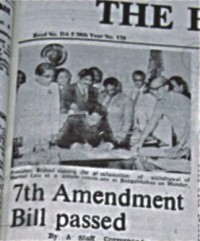
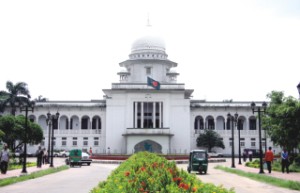
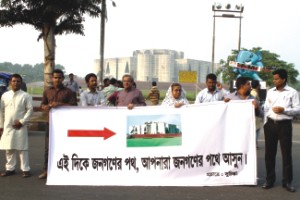
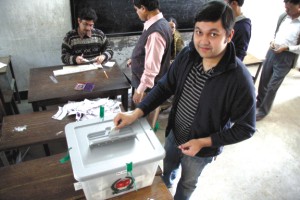
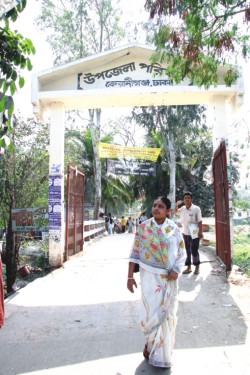

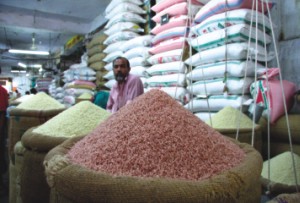
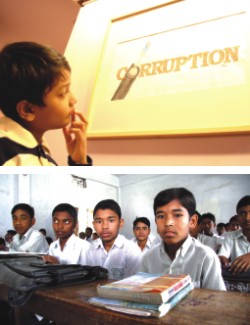 There are some issues on which both the major parties have unwittingly come to a consensus. The major parties may have many differences that they feverishly nurture to hit back at each other, but there are issues on which their stances are as common as two conjoined twins. Both the parties agree that the provision against floor crossing should remain untouched. The civil society leaders time and again have demanded the scrapping of this undemocratic provision, as it deprives the MPs of their rights to exercise their democratic choice to vote on different bills. The major parties have remained suspiciously silent about scrapping the provision, and, to make it even worse, it does not let the MPs voice their opposition in instances they feel their parties position on an issue is wrong.
There are some issues on which both the major parties have unwittingly come to a consensus. The major parties may have many differences that they feverishly nurture to hit back at each other, but there are issues on which their stances are as common as two conjoined twins. Both the parties agree that the provision against floor crossing should remain untouched. The civil society leaders time and again have demanded the scrapping of this undemocratic provision, as it deprives the MPs of their rights to exercise their democratic choice to vote on different bills. The major parties have remained suspiciously silent about scrapping the provision, and, to make it even worse, it does not let the MPs voice their opposition in instances they feel their parties position on an issue is wrong.  Obaidul Qader thinks, like cricket, the new amendments can be made a rallying cry for a broad-based national unity. "It is indeed unfortunate that the process of amending the constitution is going on without the BNP onboard. The BNP could have given a note of dissent. The constitution should be something we must feel good about, it is our common glory. All the parties must explore their common grounds based on which they should come together with their proposals for amending the constitution," he says.
Obaidul Qader thinks, like cricket, the new amendments can be made a rallying cry for a broad-based national unity. "It is indeed unfortunate that the process of amending the constitution is going on without the BNP onboard. The BNP could have given a note of dissent. The constitution should be something we must feel good about, it is our common glory. All the parties must explore their common grounds based on which they should come together with their proposals for amending the constitution," he says.